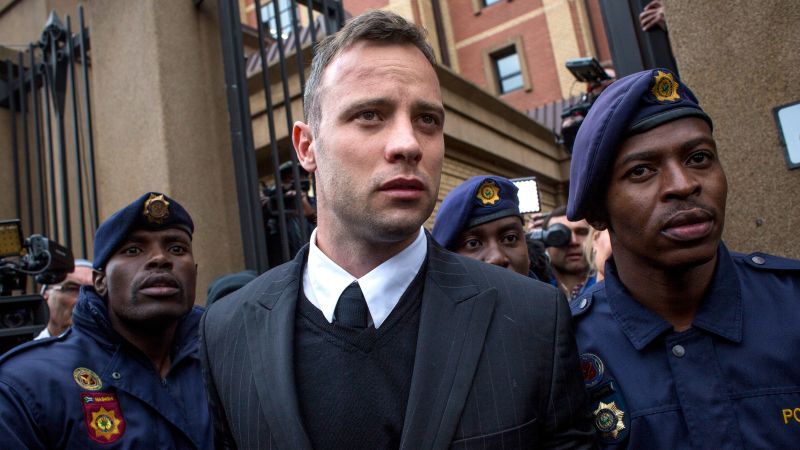CNN
—
On May 12, the CNN series “How it Really Happened” will explore the life of Oscar Pistorius, the double-amputee Paralympic and Olympic sprinter who was convicted in the murder of his girlfriend, South African model Reeva Steenkamp, more than a decade ago.
Known as the “Blade Runner” for his carbon-fiber prosthetics, Pistorius was once heralded as an inspirational figure
At the 2012 London Games, he became the first Paralympian to compete at an Olympics and during his successful track career won eight Paralympic medals, six of them gold. He was in his athletic prime when, on February 14, 2013, he killed Steenkamp.
“If you take the celebrity of LeBron James and you combined it with the appeal of Leonardo DiCaprio, that was what Oscar Pistorius was,” said Scott Roder, a crime scene reconstruction expert who worked on the case, in CNN’s documentary, hosted by Jesse L. Martin.
The documentary features footage from the court in Pretoria, South Africa, during Pistorius’s 2013 murder trial and 2023 parole hearing and original interviews with Steenkamp’s mother, modeling agent and family attorney.

Pistorius shot Steenkamp four times through the bathroom door of his house. In a trial that garnered global attention, he denied killing her in a fit of anger and instead said he had mistaken her for an intruder.
He pleaded not guilty to one charge of murder and a firearms charge associated with Steenkamp’s killing.
He was initially convicted of manslaughter and sentenced to five years in prison before that conviction was overturned and upgraded to murder, increasing his sentence to six years. In 2017, his sentence was increased to 13 years and five months by South Africa’s Supreme Court of Appeal.
The documentary examines the details leading to Steenkamp’s murder – including disagreements between the couple shared over WhatsApp and the athlete’s “obsession” with firearms, though his motives remain unknown to this day.
“Why would he kill her? Why did he do it?” Steenkamp’s mother, June, asked in the documentary.
She called Pistorius’ version of events “absolute rubbish and lies” and spoke candidly about the pain she felt on that night in 2013. She recalled the moment she was told that her daughter had died, describing it as “the worst day of my life.”
“I was hysterical,” she said. “I just wanted to die myself, honestly. I didn’t want to live without her.”
The documentary sheds light on the whirlwind romance between the couple and the life of Steenkamp, described by her mother as “a blessing, a gift from God. Very clever, and she was always laughing.”
“She would have done amazing things,” said Tania Koen, CEO of the Reeva Steenkamp Foundation. “And she was so kind and passionate and compassionate. The world was a better place with Reeva in it.”
Pistorius, now 37 years old, was released on parole on January 5 this year. A parole board granted his petition in November on the grounds that he had served half of his 13-year sentence for murdering Steenkamp, making him eligible according to South African law.
He has kept a low profile since his release, but the conditions of his parole include restrictions on his movements, mandatory classes on gender-based violence, anger management therapy, no alcohol and he’s not allowed to speak to the media.
Steenkamp’s mother has been vocal in her criticism of his release and expressed her concern for the safety of other women.
“At this time, I am not convinced that Oscar has been rehabilitated,” she said in a victim impact statement in November 2023.
“Rehabilitation requires someone to engage honestly with the full truth of his crime and the consequences thereof. Nobody can claim to have remorse if they are not able to engage fully with the truth.
“If someone does not show remorse, they cannot be considered to be rehabilitated. If they are not rehabilitated, their risk of recidivism is high.”
“Oscar Pistorius: The Bladerunner” airs on CNN on Sunday, May 12 at 9 p.m. ET/PT






